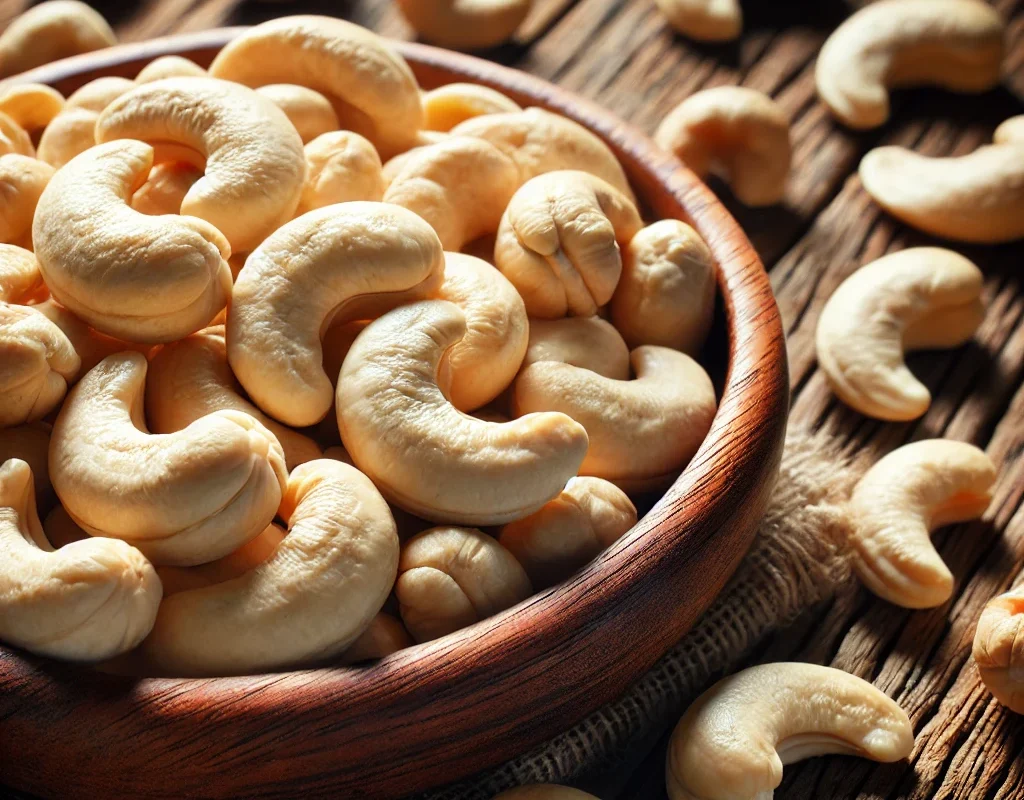Cashews are a creamy, delicious nut packed with essential nutrients that support overall health. Rich in healthy fats, protein, fiber, and important minerals like magnesium, zinc, and iron, cashews contribute to heart health, brain function, and strong bones. Their naturally sweet and buttery flavor makes them a versatile ingredient in both sweet and savory dishes. With an impressive nutritional profile, cashews are a healthful addition to a balanced diet.
Nutritional Benefits of Cashews
Rich in Nutrients: Cashews are a good source of essential nutrients, including plant-based protein, healthy fats, vitamins (such as vitamin K and several B vitamins), and minerals (such as magnesium, phosphorus, copper, and zinc).
Packed with Antioxidants: Cashews are rich in antioxidants, such as vitamin E and copper, which help protect the body from oxidative damage. These antioxidants support healthy aging, reduce inflammation, and lower the risk of chronic diseases like heart disease and cancer.
Boosts Immune Function: Cashews are rich in zinc and copper, both of which are essential for a healthy immune system. Zinc supports the body’s ability to fight infections, while copper plays a role in the production of red blood cells and maintaining healthy connective tissues.
Promotes Healthy Digestion: Cashews are a good source of dietary fiber, which is essential for digestive health. Fiber promotes regular bowel movements, prevents constipation, and supports a healthy gut microbiome.
Rich in Healthy Fats: Cashews are an excellent source of monounsaturated fats, which are considered heart-healthy fats. These fats help lower bad cholesterol (LDL) levels and support cardiovascular health. Cashews also contain omega-6 fatty acids, which are essential for reducing inflammation in the body.
Source of Plant-based Protein: Cashews provide a moderate amount of protein, offering around 5 grams per ounce. This makes them a great source of plant-based protein, supporting muscle growth, tissue repair, and overall bodily functions, especially for vegetarians and vegans.
Supports Heart Health: The healthy fats, fiber, and antioxidants found in cashews contribute to improved heart health. Regular consumption of cashews may help lower blood pressure, reduce cholesterol levels, and improve circulation, ultimately reducing the risk of cardiovascular diseases.
Good for Bone Health: Cashews are a good source of magnesium, phosphorus, and calcium, which are essential for maintaining strong bones and preventing bone-related conditions like osteoporosis. These minerals help in bone formation and the maintenance of bone density.
Improves Eye Health: Cashews contain lutein and zeaxanthin, two antioxidants that are beneficial for eye health. These compounds help protect the eyes from harmful blue light and reduce the risk of age-related macular degeneration and cataracts.
Supports Healthy Skin: Cashews are a good source of zinc, which plays a crucial role in skin health. Zinc helps with collagen production, wound healing, and may also help reduce acne and other skin issues.
Helps with Weight Management: Despite being calorie-dense, cashews can aid in weight management due to their protein and fiber content, which help promote feelings of fullness and reduce overall calorie intake. When consumed in moderation, they can support healthy weight control.
Uses of Cashews
Snacks: Cashews can be enjoyed raw, roasted, or salted as a nutritious snack.
Culinary Uses: They can be used in a variety of dishes, including stir-fries, salads, and desserts. Cashews are often blended into sauces and creams for a creamy texture in vegan recipes.
Cashew Butter: Similar to peanut butter, cashew butter is a delicious spread that can be used in sandwiches, smoothies, or as a dip.
Cashew Milk: Cashew milk is a popular dairy alternative made by blending cashews with water, often used in smoothies, coffee, and baking.
Safety Considerations
Allergies: Some individuals may have allergies to cashews or other tree nuts. Symptoms can range from mild to severe, including anaphylaxis. Those with known nut allergies should avoid cashews.
Caloric Density: While cashews are nutritious, they are also calorie-dense. Portion control is important, especially for individuals managing their weight.
Sodium Content: Salted cashews can be high in sodium, which may not be suitable for individuals on a low-sodium diet. Opting for unsalted varieties can help mitigate this concern.
Interactions with Medications: Cashews may interact with certain medications, particularly those affecting blood pressure or cholesterol levels. Consult a healthcare provider if you are on medication.
Conclusion
Incorporating cashews into your diet is a tasty and nutritious way to support overall well-being. Their combination of healthy fats, protein, and essential minerals makes them a satisfying snack that promotes heart health, energy, and immune function. Enjoyed on their own, blended into sauces, and added to meals, cashews offer a delicious and versatile option for boosting nutrition. By making them a regular part of your diet, you can enjoy their many health benefits while adding a touch of natural creaminess to your favorite dishes.
